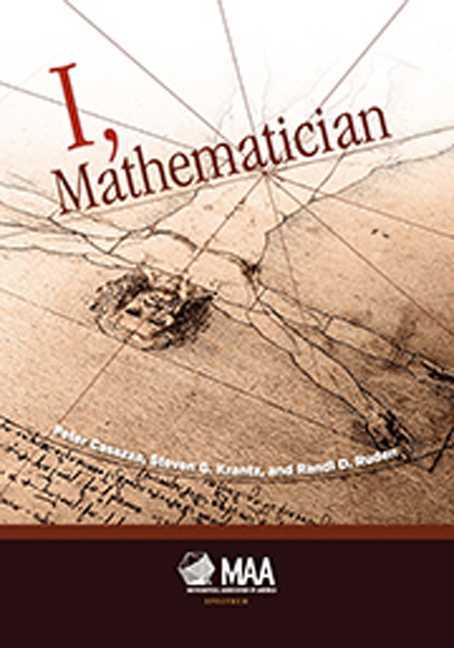Book contents
- Frontmatter
- Contents
- Preface
- Part 1 Who Are Mathematicians?
- Part II On Becoming a Mathematician
- Part III Why I Became a Mathematician
- Foreword to Why I Became a Mathematician
- 20 Why I Became a Mathematician: A Personal Account
- 21 Why I Became a Mathematician?
- 22 Why I am a Mathematician
- 23 Why I am a Mathematician
- 24 Why I am a mathematician
23 - Why I am a Mathematician
from Part III - Why I Became a Mathematician
- Frontmatter
- Contents
- Preface
- Part 1 Who Are Mathematicians?
- Part II On Becoming a Mathematician
- Part III Why I Became a Mathematician
- Foreword to Why I Became a Mathematician
- 20 Why I Became a Mathematician: A Personal Account
- 21 Why I Became a Mathematician?
- 22 Why I am a Mathematician
- 23 Why I am a Mathematician
- 24 Why I am a mathematician
Summary
We think we are in charge of our own lives. But psychology would have it that in actuality we are driven by subconscious forces not only beyond our conscious control but outside our full comprehension. We can modify these forces by rational control. But at heart we are carried along by currents over which we have limited influence.
This was surely so in my life. My parents assured me later that, at a time too early for me now to remember, well before my fourth birthday when I began formal musical training and long before I had engaged in any mathematical study whatever, I was showing interest in two main things: music and numbers. The interest in music is easy to understand: my parents were professional musicians and I was surrounded by music from the beginning. And I demanded to be taught to read music long before I evinced any interest in learning to read words. But the source of my early fascination with numbers is less obvious. Many of the people in my more extended family had been in technical professions, engineering in particular. But mathematics did not figure in my immediate family environment at all.
Even so, mathematics seized my imagination long before I was in a position to know anything about it in a formal way. Mathematical patterns of thought are of course the common property of everyone to some extent. They seem to be innate in the human mind. For me, and early on, this particular form of thought was one I wanted for my own above all others.
Some success later on in mathematical competitions encouraged me to think that I would be able to pursue the subject successfully as a profession. And being a university professor seemed to me in any case a natural choice of occupation, since it was my father's. But the point of origination was simply that mathematics seemed to me from the very start how I wanted to think.
These two interests, mathematics and music, both arising early in my life, never quite allowed the one to triumph over the other. Only in my early twenties when a practical choice was a necessity did I choose mathematics over music as my way to make a living. But music remains with me.
Information
- Type
- Chapter
- Information
- I, Mathematician , pp. 264 - 265Publisher: Mathematical Association of AmericaPrint publication year: 2015
